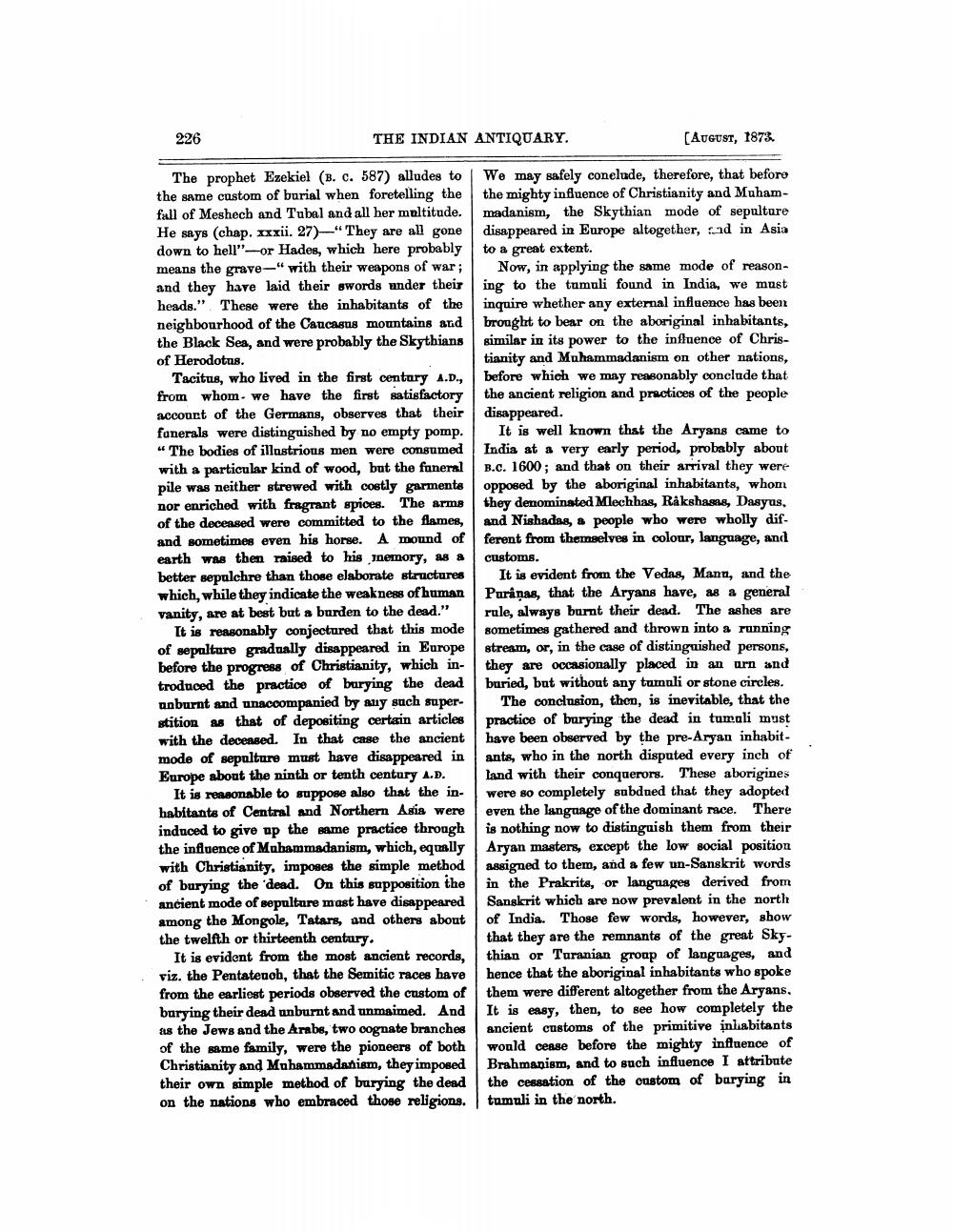________________
226
THE INDIAN ANTIQUARY.
(AUGUST, 1873.
The prophet Ezekiel (B. c. 587) alludes to We may safely conclude, therefore, that before the same custom of burial when foretelling the the mighty influence of Christianity and Muhamfall of Meshech and Tubal and all her multitude. madanism, the Skythian mode of sepulture He says (chap. xxxi. 27)—" They are all gone disappeared in Europe altogether, and in Asia down to hell"-or Hades, which here probably to a great extent. means the grave-" with their weapons of war; | Now, in applying the same mode of reasonand they have laid their swords under their ing to the tumuli found in India, we must heads." These were the inhabitants of the inquire whether any external influence has been neighbourhood of the Caucasus mountains and brought to bear on the aboriginal inhabitants, the Black Sea, and were probably the Skythians similar in its power to the influence of Chrisof Herodotus.
tianity and Muhammadanism on other nations, Tacitus, who lived in the first century A.D., before which we may reasonably conclude that from whom we have the first satisfactory the ancient religion and practices of the people account of the Germans, observes that their disappeared. fanerals were distinguished by no empty pomp. It is well known that the Aryans came to
The bodies of illustrious men were consumed India at a very early period, probably about with a particular kind of wood, but the funeral B.c. 1600; and that on their arrival they were pile was neither strewed with costly garments opposed by the aboriginal inhabitants, whom nor enriched with fragrant spices. The arms they denominated Mlechhas, Rakshasas, Dasyus, of the deceased were committed to the flames, and Nishadna, a people who were wholly difand sometimes even his horse. A mound of ferent from themselves in colour, language, and earth was then raised to his nemory, as a customs. better sepulchre than those elaborate structures It is evident from the Vedas, Mann, and the which, while they indicate the weakness of human Purinas, that the Aryans have, as a general vanity, are at best but a burden to the dead." rule, always burnt their dead. The ashes are
It is reasonably conjectured that this mode sometimes gathered and thrown into a running of sepulture gradually disappeared in Europe stream, or, in the case of distinguished persons, before the progress of Christianity, which in they are occasionally placed in an arn and troduced the practice of burying the dead buried, but without any tumuli or stone circles. unburnt and unaccompanied by any such super- The conclusion, then, is inevitable, that the stition as that of depositing certain articles practice of burying the dead in tumali must with the deceased. In that case the ancient have been observed by the pre-Aryan inhabit - mode of sepulture must have disappeared in ants, who in the north disputed every inch of Europe about the ninth or tenth century AD. land with their conquerors. These aborigines
It is reasonable to suppose also that the in- were so completely subdned that they adopted habitants of Central and Northern Asia were even the language of the dominant race. There induced to give up the same practice through is nothing now to distinguish them from their the influence of Muhammadanism, which, equally Aryan masters, except the low social position with Christianity, imposes the simple method assigned to them, and a few un-Sanskrit words of burying the dead. On this supposition the in the Prakrits, or languages derived from ancient mode of sepultare mast have disappeared Sanskrit which are now prevalent in the north among the Mongole, Tatars, and others about of India. Those few words, however, show the twelfth or thirteenth century.
that they are the remnants of the great SkyIt is evident from the most ancient records, thian or Turanian group of languages, and viz. the Pentateuch, that the Semitic races have hence that the aboriginal inhabitants who spoke from the earliest periods observed the custom of them were different altogether from the Aryans, burying their dead unburnt and unmaimed. And It is easy, then, to see how completely the as the Jews and the Arabe, two cognate branches ancient customs of the primitive inhabitants of the same family, were the pioneers of both would cease before the mighty influence of Christianity and Muhammadanism, they imposed Brahmanism, and to such influence I attribute their own simple method of burying the dead the cessation of the custom of barying in on the nations who embraced those religions. tumuli in the north.




